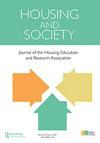意外搬迁对危机后住房状况的影响
Q2 Social Sciences
引用次数: 2
摘要
目前,关于因危机事件而流离失所的家庭后续住房决策的研究并不多。危机事件包括灾难,但也可能包括与驱逐和丧失抵押品赎回权有关的计划外行动。美国住房调查为研究界提供了一个机会,通过一个与2013年推出的近期搬家者相关的特殊模块来研究这种情况。使用与居住满意度和住房成本负担相关的幸福感指标,我们分析了常规搬家者和因危机情况而搬家者在这些指标上的差异。初步分析表明,与危机情况下搬家的家庭相比,定期搬家的家庭对住房单位和社区的满意度更高,住房成本比更低。在与家庭以前的住房情况进行比较时,也得出了类似的结果。然而,在控制了人口统计和其他自变量之后,危机事件对居住满意度的影响是无效的。住房成本比在不同的租住期内呈现出不同的路径,租房者在搬迁时成本负担较大,而购房者的成本比实际上显著降低。本文章由计算机程序翻译,如有差异,请以英文原文为准。
The effects of unplanned moves on post-crisis housing situations
ABSTRACT Currently, there is not much research on subsequent housing decisions for households that are displaced due to a crisis event. Crisis events include disasters, but can also include unplanned moves related to eviction and foreclosure as well. The American Housing Survey provides the research community the opportunity to examine such situations through a special module related to recent movers introduced in 2013. Using measures of well-being related to residential satisfaction and housing cost burden, we analyze the differences in these measures for both regular movers and those who have moved due to circumstances of crisis. Initial analysis shows that there are highly significant differences between the two populations, with regular movers having higher housing unit satisfaction and neighborhood satisfaction, and lower housing cost ratios, when compared against households which moved under crisis situations. Similar findings are made when comparing against households’ previous housing situations as well. After controlling for demographic and other independent variables, however, the effect of crisis events is nullified for residential satisfaction. Housing cost ratios take divergent paths according to tenure, with renters having heavy cost burdens upon relocation and homebuyers actually reducing their ratios significantly.
求助全文
通过发布文献求助,成功后即可免费获取论文全文。
去求助
来源期刊

Housing and Society
Social Sciences-Urban Studies
CiteScore
2.30
自引率
0.00%
发文量
10
期刊介绍:
Housing and Society is the journal of the Housing Education and Research Association (HERA). The journal supports the mission of HERA by providing for the dissemination of research and other scholarly work. Submissions from a broad range of perspectives are encouraged. Topics in housing include: policy, design, social aspects, gerontology, behavioral aspects, energy/environment, equipment, interiors, economics, theory/model development, education, and program development or evaluation. The journal welcomes the submission of original research articles, notes and commentaries. Notes are shorter manuscripts presenting succinct information on housing related to one of the following categories: - Research: exploratory or not heavily theory-based or statistically analyzed - Academic: innovative teaching ideas - Program: development, implementation, and/or evaluation of Cooperative Extension or other housing programming efforts - Policy: examination of policy impact, comparative analysis, and/or need to achieve housing goals - Reviews: books, documentaries, etc.
 求助内容:
求助内容: 应助结果提醒方式:
应助结果提醒方式:


